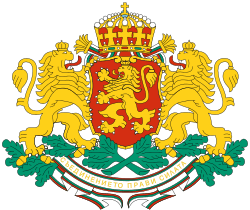Dimitrov Constitution
 |
| This article is part of a series on the politics and government of Bulgaria |
|
Presidency |
|
The Dimitrov Constitution was the Constitution of Bulgaria in effect from 1947 to 1971. Georgi Dimitrov, after whom the document is named, guided the framing of the 1947 constitution on the model of the 1936 constitution of the Soviet Union.[1] The Dimitrov Constitution guaranteed citizens equality before the law; freedom from discrimination; a universal welfare system; freedom of speech, the press, and assembly; and inviolability of person, domicile, and correspondence.[1] But those rights were qualified by a clause prohibiting activity that would jeopardize the attainments of "the national revolution of September 9, 1944."[1] Citizens were guaranteed employment but required to work in a socially useful capacity.[1] The constitution also prescribed a planned national economy.[1] Private property was allowed, if its possession was not "to the detriment of the public good."[1]
References
- 1 2 3 4 5 6 Glenn E. Curtis. "The Dimitrov Constitution". Bulgaria: A country study (Glenn E. Curtis, ed.). Library of Congress Federal Research Division (June 1992).
 This article incorporates text from this source, which is in the public domain.
This article incorporates text from this source, which is in the public domain.